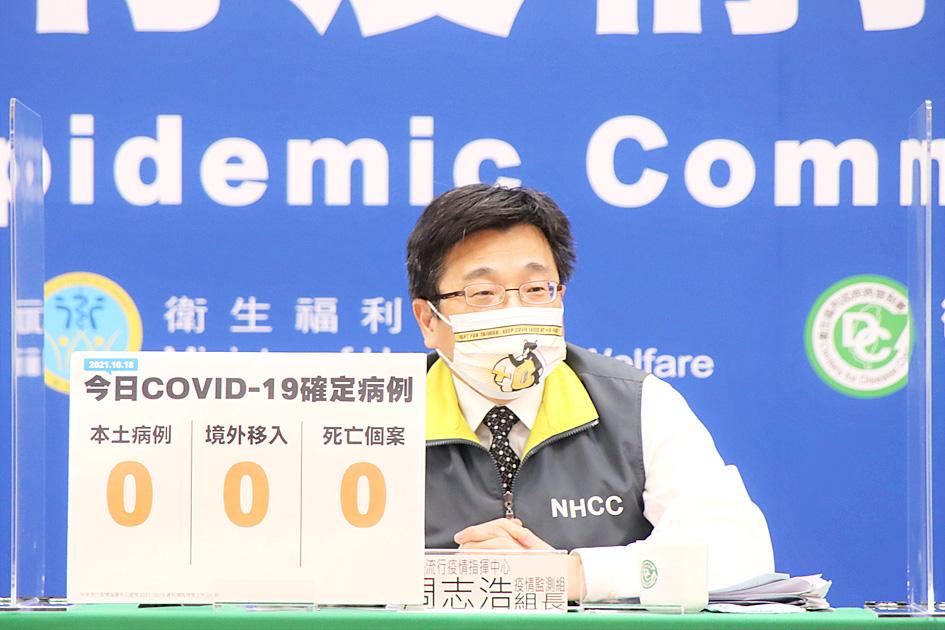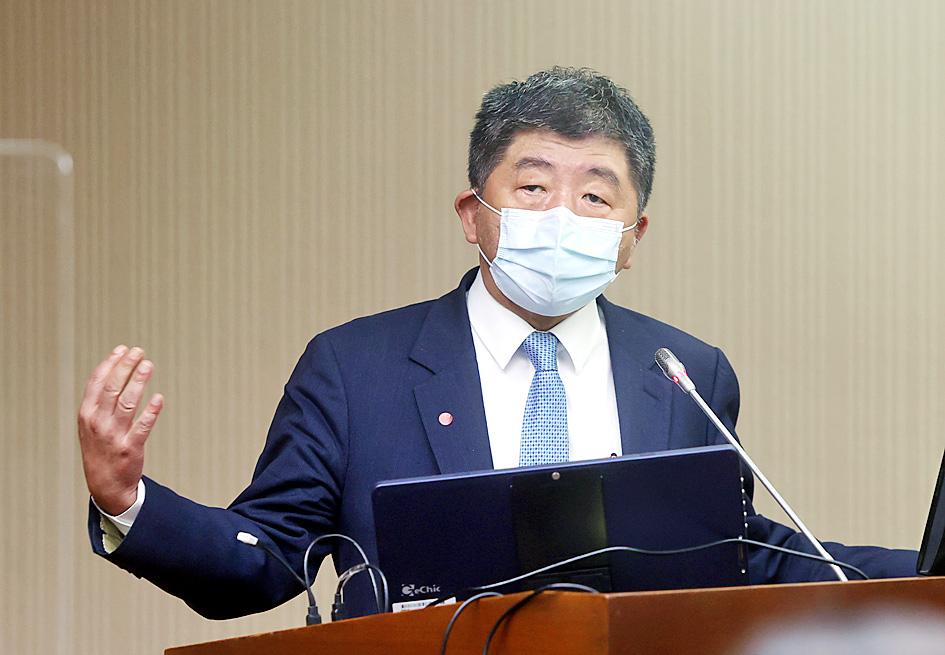Yesterday was the first time in 193 days that all daily COVID-19 case numbers returned to zero, with the Central Epidemic Command Center (CECC) reporting no new infections or deaths.
“This is the first time since April 8, which was 193 days ago, that we reported zero ... locally transmitted cases, imported cases and deaths,” said Centers for Disease Control (CDC) Director-General Chou Jih-haw (周志浩), who also heads the CECC’s disease surveillance division. “Of course, we are glad to see the numbers return to zero, but we need to work hard to keep up the good work.”
Chou said that a total of 356,483 COVID-19 vaccine doses were administered on Sunday and yesterday, bringing the nation’s first-dose vaccination rate to 62.4 percent, with 84.61 doses administered per 100 people.

Photo courtesy of the CDC
Separately at the Legislative Yuan in Taipei yesterday morning, a reporter asked Minister of Health and Welfare Chen Shih-chung (陳時中), who heads the CECC, whether Taiwan was close to lowering the COVID-19 alert to level 1.
“You can say so,” Chen said.
Asked if it could be lowered to level 1 by next month, Chou said at the news briefing that it could be lowered by then, but that the CECC was still discussing comprehensive criteria for adjusting the alert level and would make a public announcement as soon as a final decision is made.

Photo: CNA
Asked about a physician’s remark that border control measures would most likely be eased after May next year, Chou said: “Reopening the national borders is a very big decision, and it would depend on the global COVID-19 situation and Taiwan’s preparedness for it.”
Reopening borders is a frequently discussed issue, and changes in the government’s policy would be announced when a final decision is made, he said.
Chen urged people to get vaccinated as early as possible, adding that mixing vaccine brands might be possible next month, depending on supply.
Asked to confirm whether mixing COVID-19 vaccines would be an option for the public from next month, Chou said that the decision would be made according to the supply of vaccines in Taiwan and specialists’ recommendations.
As of 1pm yesterday, more than 860,000 people, or 63.6 percent, had booked an appointment for their first dose of the Pfizer-BioNTech vaccine in the first phase of the 12th round of vaccinations, which opened at 10am yesterday, he said.
Taipei Deputy Mayor Tsai Ping-kun (蔡炳坤) said that the city can administer up to 200,000 doses of vaccines per week, but asking for 600,000 doses to be administered in two weeks for the 12th round of vaccinations was overwhelming to the city’s healthcare capacity.
CDC Deputy Director-General Chuang Jen-hsiang (莊人祥), who is the CECC’s spokesman, said the center would assist local governments in meeting this challenging task by adding five vaccination stations.
That meant an extra batch of more than 45,000 people could book appointments for the Pfizer-BioNTech vaccine yesterday afternoon, Chuang said.

NATIONAL SECURITY THREAT: An official said that Guan Guan’s comments had gone beyond the threshold of free speech, as she advocated for the destruction of the ROC China-born media influencer Guan Guan’s (關關) residency permit has been revoked for repeatedly posting pro-China content that threatens national security, the National Immigration Agency said yesterday. Guan Guan has said many controversial things in her videos posted to Douyin (抖音), including “the red flag will soon be painted all over Taiwan” and “Taiwan is an inseparable part of China,” while expressing hope for expedited “reunification.” The agency received multiple reports alleging that Guan Guan had advocated for armed reunification last year. After investigating, the agency last month issued a notice requiring her to appear and account for her actions. Guan Guan appeared as required,

A strong cold air mass is expected to arrive tonight, bringing a change in weather and a drop in temperature, the Central Weather Administration (CWA) said. The coldest time would be early on Thursday morning, with temperatures in some areas dipping as low as 8°C, it said. Daytime highs yesterday were 22°C to 24°C in northern and eastern Taiwan, and about 25°C to 28°C in the central and southern regions, it said. However, nighttime lows would dip to about 15°C to 16°C in central and northern Taiwan as well as the northeast, and 17°C to 19°C elsewhere, it said. Tropical Storm Nokaen, currently

‘NATO-PLUS’: ‘Our strategic partners in the Indo-Pacific are facing increasing aggression by the Chinese Communist Party,’ US Representative Rob Wittman said The US House of Representatives on Monday released its version of the Consolidated Appropriations Act, which includes US$1.15 billion to support security cooperation with Taiwan. The omnibus act, covering US$1.2 trillion of spending, allocates US$1 billion for the Taiwan Security Cooperation Initiative, as well as US$150 million for the replacement of defense articles and reimbursement of defense services provided to Taiwan. The fund allocations were based on the US National Defense Authorization Act for fiscal 2026 that was passed by the US Congress last month and authorized up to US$1 billion to the US Defense Security Cooperation Agency in support of the

PAPERS, PLEASE: The gang exploited the high value of the passports, selling them at inflated prices to Chinese buyers, who would treat them as ‘invisibility cloaks’ The Yilan District Court has handed four members of a syndicate prison terms ranging from one year and two months to two years and two months for their involvement in a scheme to purchase Taiwanese passports and resell them abroad at a massive markup. A Chinese human smuggling syndicate purchased Taiwanese passports through local criminal networks, exploiting the passports’ visa-free travel privileges to turn a profit of more than 20 times the original price, the court said. Such criminal organizations enable people to impersonate Taiwanese when entering and exiting Taiwan and other countries, undermining social order and the credibility of the nation’s